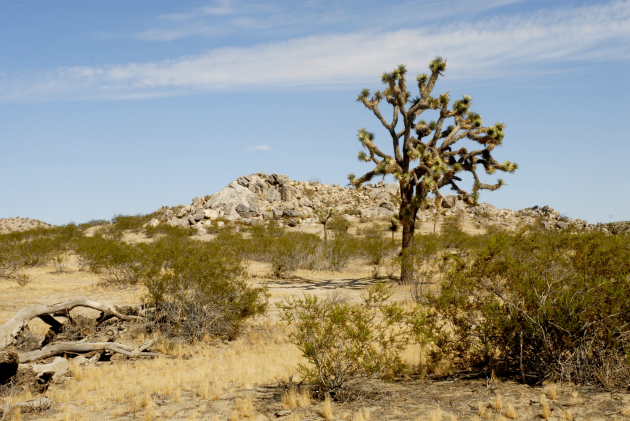We’re so honored that the OneJustice Executive Fellowship program was highlighted by the American Bar Association Access to Justice blog as one step forward in cultivating and supporting our sector’s future leaders!
Monthly Archives: February 2014
It takes a network . . . of innovative thinkers
Circles of passionate thinkers
Coming together to shape the future of philanthropy
OneJustice supports a statewide network of nonprofits, law schools, law firms, and businesses that provide life-changing legal help to hundreds of thousands of Californians facing legal barriers to basic necessities. You – like everyone in our network – are an essential part of this collective effort!
This month we’re excited to feature Full Circle Fund as another example of how “It Takes a Network” to achieve access to justice for Californians in need. Last year, the Full Circle Fund Rising Leaders program provided wonderful support to OneJustice in the development of a design for a completely virtual legal services clinic – using technology to connect urban lawyers and law students with rural communities. We were able to connect with Tejal Desai, Full Circle Fund’s Manager of Marketing and Communications, for a quick Q&A about Full Circle Fund and its work.
. . . . . . . . . . . . . . . . . . . . . . . . . . . . . . . . . . . . . . . . . . . . . . . . . . . . . . . . . . . . . . . . . . . . . . . . .
OneJustice: Tell us a little bit about Full Circle Fund – what it is and what does it do?
Tejal Desai: Full Circle Fund is an active network of professionals who leverage their time, talent and connections to help nonprofit organizations create more impact.
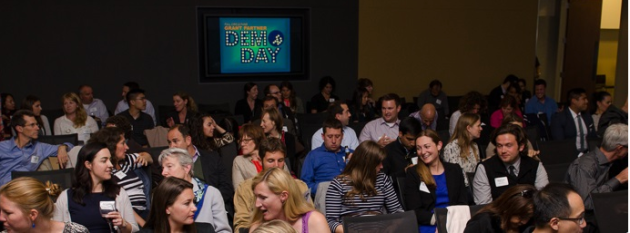
Each year, Full Circle Fund members gather at Demo Day, where the current year’s grant portfolio is unveiled.
We bring together these talented individuals (who we call “Members”) to accelerate local change through the collaborative infrastructure of what we refer to as our Circles. Circles unite Members with a common interest in our key issue areas – Economic Opportunity, Education, and Energy/Environment.
OneJustice: That sounds pretty amazing! How can people get involved?
Tejal: These talented individuals apply for membership and meet with current Members and staff, as well as attend our events, to see if there’s a good fit. Once they join, our Members dive right into our projects!
OneJustice: And how does the Rising Leaders program work? Who participates?
Tejal: Rising Leaders are ambitious and eager early-career individuals who are passionate about making their community and the world a better place. The program was launched thanks to the support of the Koret Foundation in 2012.
Our Rising Leaders receive leadership development and mentorship opportunities, speaker programs, and a separate grant budget for the program participants to plan unique engagement/learning opportunities and events.
To date, our growing group of Rising Leaders have continued to support our current Grant Partners while impacting the larger community; they have helped over 15 organizations outside Full Circle Fund’s current Grant Portfolio with their pressing needs during three-hour consultation and interactive brainstorm sessions, or Idea Jamathons. They continue to wow us through their thought leadership and innovative approaches towards actively engaging our Members with local non-profits that seek support.

Rising Leaders and other Full Circle Fund members work through how to create a completely virtual legal services clinic – the idea that won the June 2013 Idea Jamathon.
OneJustice: Last year OneJustice was honored to be selected to work with the Rising Leaders in an Idea Jamathon. Can you tell us a bit about that idea and how it works?
Tejal: In early spring 2013, the Rising Leaders opened applications to local non-profit organizations, searching for innovative non-profits with a unique mission and specific set of issue areas to help during a day of collaboration at our first-ever Idea Jamathon. The group then narrowed the selection choice down to seven non-profits to participate in the inaugural Idea Jamathon.
All seven local non-profit organizations then competed to win a $5,000 grant by spending an afternoon solving an issue area that was presented at the beginning of the program. After a day of brainstorming and collaboration, each group presented its solution, and the Rising Leaders voted on OneJustice as having the most innovative solution!
OneJustice: And what most interests you about OneJustice’s approach and strategies?
Tejal: OneJustice takes the hand-up over hand-out approach, which we live and breathe by! We believe in the power of direct and engaged participation and in leveraging talent, paired with a very specific skill set, to help those in need. Access to justice is an especially pressing issue in California for families and individuals (not just lawyers!), and we’re impressed by OneJustice’s direct approach in making legal services and support more accessible to those who are in need.
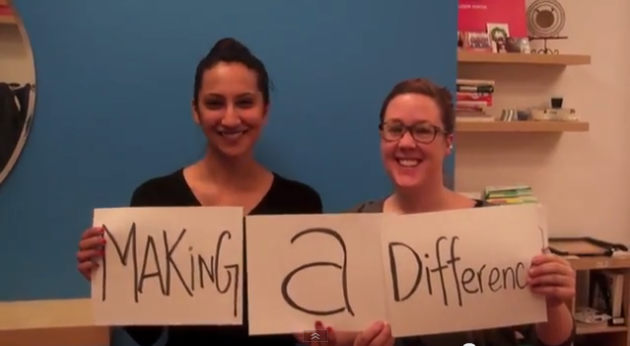
Full Circle Fund staff Tejal Desai and Maegan Lillis joined in the OneJustice network’s 2013 “thank you” video – to see the whole video click on this image.
From all of us at OneJustice, a huge thank you to the Rising Leaders and all the members of Full Circle Fund for their innovative approach to helping nonprofits scale creative responses to pressing problems and for their terrific support for OneJustice and expanding life-changing legal help to those in need!
Rural California Veterans Thirsty for Legal Support
What’s in the news: California is suffering from a drought.
What doesn’t make the news: too many veterans are living in legal services deserts.
By Renee Schomp, OneJustice Equal Justice Works AmeriCorps Legal Fellow
At this point, a lot of us have probably heard that many of the people that the United States has sent off to war return to a life back home that is rife with poverty and struggle. And this is no abstract concept: last May, a federal appeals court in San Francisco found that 18 veterans commit suicide every single day. I don’t know about you, but my first reaction to information like this – after I recover from my heartbreak – is to ask, “Where are these people right here in my home state?” and “What can we do to make their lives even a little bit better?”
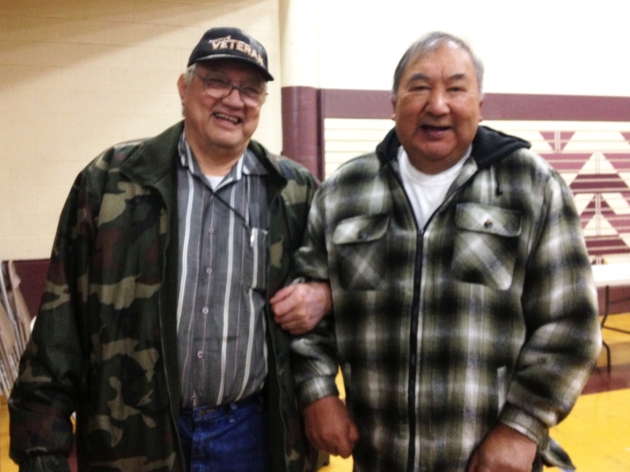
The Justice Bus Project reaches low-income veterans in rural counties across California. The veterans pictured here were served at the Hoopa Valley Tribe community in Del Norte County.
What can we do to make veterans’ lives a little bit better? It turns out that there’s a pretty simple answer. Here’s the deal: California is home to 1.8 million of our nation’s 22 million veterans. And California veterans lag considerably behind national numbers in terms of use of veteran benefits. The government is giving out money to folks who served our country – and a ton of those folks are living on the street, not even getting paid money they’re owed.
Bear with me on these numbers and you’ll be amazed. In California, 30.7% of veterans are disabled, but only 15.7% receive the compensation and pension the Veterans Administration (“VA”) can provide them.
This means that half of the disabled veterans in the state of California do not receive veterans’ benefits!
So where are the veterans who need support – and where are the lawyers who can provide it? I’ll wager a bet that when most of you think about low-income California veterans who probably need legal support, you think of folks living in places like Skid Row or the Tenderloin. And you would not be far off: the highest number of California veterans living in poverty are in fact concentrated in cities like Los Angeles and San Francisco.
But the truth is, there are also many lawyers – both corporate and non-profit alike – who live in these urban meccas. So while the legal needs of low-income urban veterans are high, there are a number of lawyers nearby who can help them. But the many veterans who live in rural towns and the countryside throughout the state of California lack even the most basic access to lawyers who can help them apply for, say, those vital VA benefits.
I imagine you’ve heard of a “food desert.” Well, California’s rural veterans live in legal services deserts. (If not literal, dust-on-your-boots deserts.) There are too few lawyers in rural parts of California to help the many low-income people who live there.
Rural veterans are less educated, have higher rates of disability, and are older than their urban veteran counterparts. Veteran residents number, at minimum, 26,000, in California’s designated rural communities. That is a lot of American heroes who probably could use some basic legal services. We’ve crunched the numbers, and here are some of the legal services deserts where they live:
Chart: Rural Counties with Lowest Ratio of Attorneys to Low-income Veterans
So, how do we get lawyers to California’s legal services deserts? OneJustice’s Justice Bus Project focuses on narrowing the justice gap that exists where California’s rural, low-income communities confront a dearth of legal services providers. We have found that tons of law students and lawyers who work at firms and corporations in California want to partner with rural legal services nonprofits to work, pro bono, to serve those in need. So we literally put pro bono lawyers and law students from California’s urban centers on a bus and drive them out to rural areas of California to provide free legal services to underserved individuals.
And that is what we’re doing now that we’ve realized that there are so many veterans who need help with their veterans’ benefits claims, among other legal issues. It’s not a quick fix – and there are plenty of other obstacles just waiting to confront our veterans – but ultimately it’s a simple solution to what is, really, a simple problem.
So we’re hitting the road to reach those veterans. We’ll see you on the freeway!
————————————
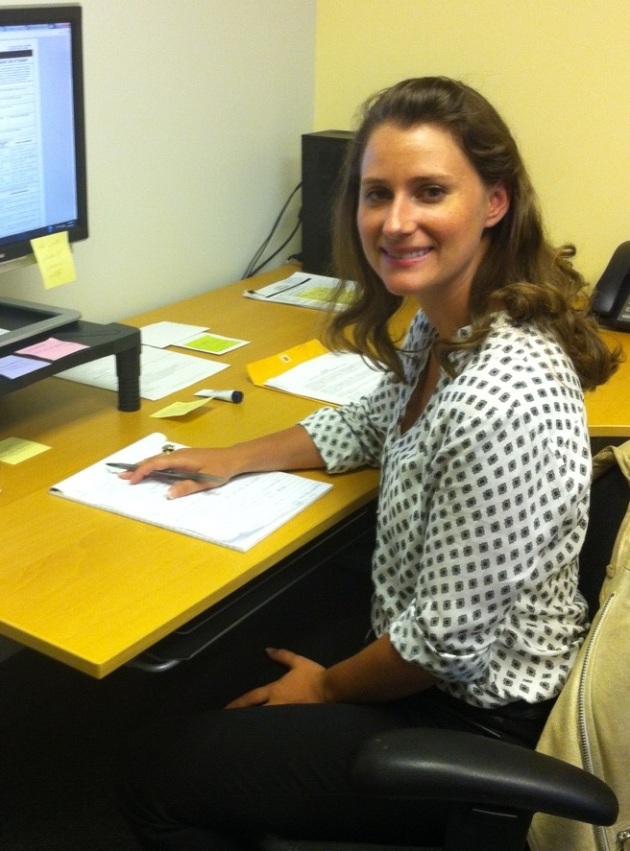 Renee Schomp is an Equal Justice Works AmeriCorps Fellow and a proud participant in Equal Justice Work’s national Veterans Legal Corps. At OneJustice, she is responsible for leading Justice Bus Trips throughout Northern California, working to bring attorney and law student volunteers from urban areas to serve isolated communities.
Renee Schomp is an Equal Justice Works AmeriCorps Fellow and a proud participant in Equal Justice Work’s national Veterans Legal Corps. At OneJustice, she is responsible for leading Justice Bus Trips throughout Northern California, working to bring attorney and law student volunteers from urban areas to serve isolated communities.
This blog is cross-posted on the Equal Justice Works Blog.
Two words that just don’t seem right together
Veterans. Poverty.
Doesn’t it seem like these two things just shouldn’t go together?
And yet, so sadly, for too many veterans, they do. And to bring some awareness to this issue, we posed this question to the OneJustice network in our February justice contest:
Which county in California, after Los Angeles and San Diego, has the highest number of veterans living in poverty?
And what a range of guesses we received! Your guesses submitted on facebook, twitter, or LinkedIn included: Orange, Kern, Santa Clara, Los Angeles, Stanislaus, Solano, Madera, Riverside, San Francisco, San Joaquin, San Bernardino, and Sacramento. All great guesses!
And the answer is (drum roll please……..):San Bernardino County, with over 8,100 veterans living at or below the poverty line.
One person posted the correct answer: Martha Wright. Thank you for playing, Martha! Your OneJustice water bottle is on its way to you.
In 2013, OneJustice launched an initiative to help bring legal assistance to veterans throughout California. With over 1.8 million veterans in the state, thousands of veterans are living in poverty, and many are homeless. These veterans face a host of legal problems – ranging from inappropriate denials of veterans benefits and medical care, to legal barriers to employment, to divorce and child custody, and more.
We are proud to partner with Equal Justice Works to bring their Veterans Legal Corps Fellows to California, where our seven Fellows are placed at Legal Aid Foundation of Los Angeles and Inner City Law Center to serve low-income veterans in Los Angeles. And your wonderful support for the Justice Bus Project has helped bring life-changing legal help to veterans living in rural and isolated areas.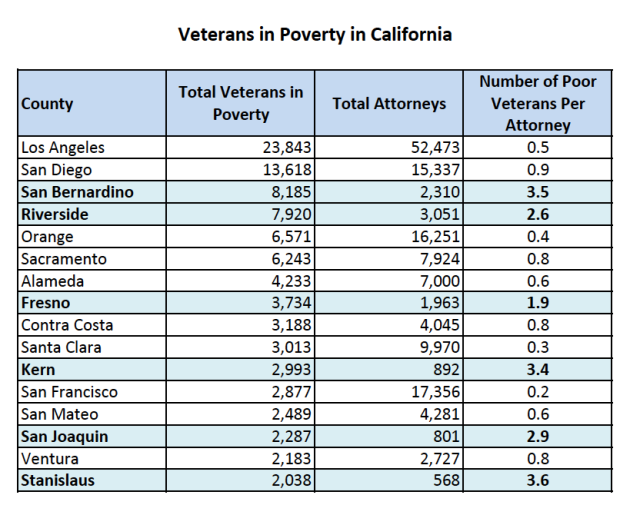
Recently we’ve been crunching some pretty sad numbers to determine which counties have the highest number of veterans living in poverty with the lowest number of local attorneys who could provide pro bono assistance. We know those counties – with many veterans living in poverty and fewer local attorneys to help – that is where our volunteers can make the most difference.
This chart shows the results of our research. Many counties have more attorneys than low-income veterans. In these counties, the local bar should be a viable pro bono resource. But some counties – like San Bernardino, Riverside, Kern, Fresno, San Joaquin, and Stanislaus – have 2 or even more low-income veterans for every local attorney. These areas are where bringing in Justice Bus volunteers can make all the difference.
And this is why the Justice Bus Project has been doing trips to serve veterans in the Inland Empire – both San Bernardino and Riverside counties. And it’s why we are exploring doing trips to Kern and Fresno counties.
Your support keeps these vital services flowing to veterans in need. Thank you!
